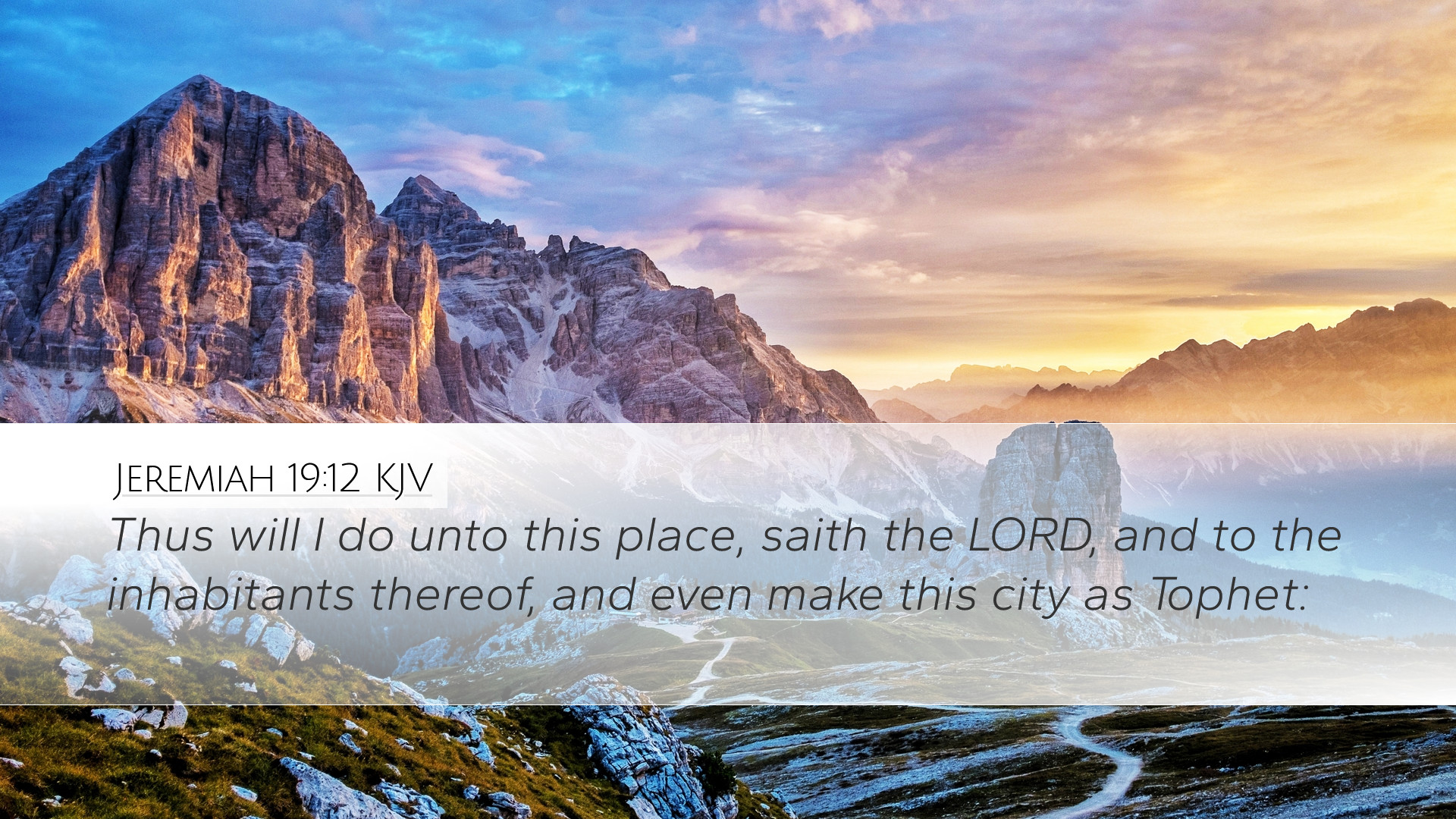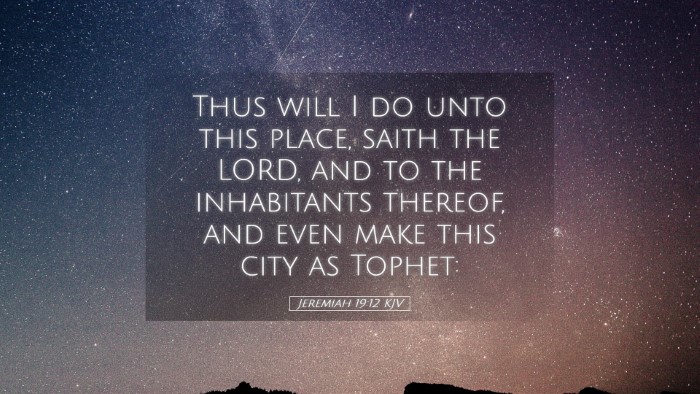Commentary on Jeremiah 19:12
Jeremiah 19:12 states:
"Thus saith the Lord of hosts; Even so will I do unto this place, and to the inhabitants thereof, and even make this city as Tophet."
Introduction
This verse occurs within a poignant context of prophetic symbolism and divine judgment. It encapsulates critical themes in the Book of Jeremiah, including the consequences of idolatry and the enormity of divine wrath against a people who rejected their covenant with God. In understanding the implications of this verse, insights from various public domain commentaries—particularly those by Matthew Henry, Albert Barnes, and Adam Clarke—will be synthesized to offer a comprehensive examination suited for pastors, students, theologians, and Bible scholars.
Contextual Background
Jeremiah prophesied during a time of significant turmoil for Israel, particularly Judah. His ministry spanned the last decades of the kingdom of Judah, culminating in its destruction. The reference to "Tophet" signifies a place associated with the worship of false gods—specifically, it refers to a location in the Valley of Hinnom where child sacrifices were offered to the god Molech. This historical and geographical context is vital for understanding the severity of the message conveyed in this verse.
The Significance of "Thus saith the Lord of hosts"
When God commands through Jeremiah, "Thus saith the Lord of hosts," it serves to underline the authority and solemnity of the prophecy. This phrase illustrates God's omnipotence as the heavenly armies’ commander, stressing that His declarations are not merely propositions but divine imperatives that will inevitably be fulfilled.
Understanding "Even so will I do unto this place"
The divine pronouncement reflects an incontrovertible decision regarding the fate of Jerusalem and its inhabitants. This is essential in exploring the principle of divine justice whereby God responds to human actions—particularly those that involve covenant breaches and blatant idolatry. Both Matthew Henry and Adam Clarke emphasize that such judgments are not arbitrary but are the results of long-standing patterns of disobedience and rebellion against God's commandments.
Tophet as a Symbol of Judgment
The reference to Tophet symbolizes not only the judgment awaiting Jerusalem but also serves as a stark warning. Albert Barnes notes that the comparison serves to evoke the horrors associated with idol worship—indicating that those who reject God will ultimately experience catastrophic consequences similar to the abominable practices executed in that infamous location. The imagery of destruction associated with Tophet resonates deeply with the concept of being "given up" to the consequences of sin—theological implications reverberating through both the Old and New Testaments.
Theological Implications
- Divine Justice: Jeremiah 19:12 lays bare the principle of divine justice where God's engagements with humanity must culminate in righteousness. This characterization urges readers to contemplate their personal and corporate lives in light of God's standards.
- Hope amidst Judgment: While the impending judgment is severe, the Book of Jeremiah is not devoid of hope. Later chapters reveal God's plans for restoration, illustrating that while righteous judgment is certain, salvation is equally available to the repentant.
- Warning to Nations: This verse resonates beyond its immediate historical context, and serves as a timeless warning to nations today regarding the consequences of moral and spiritual dereliction.
Reflections on Human Responsibility
In light of this verse, scholars are prompted to reflect on the call to human responsibility. Adam Clarke's insights align with the call to repentance, suggesting that recognizing the depths of sin leads to understanding the necessity of turning back to God. This theme is consistent with the broader biblical narrative which emphasizes both judgment and mercy.
Conclusion
The profound implications of Jeremiah 19:12 extend beyond mere historical significance; they call for a deep examination of contemporary spiritual conditions. For pastors and theologians alike, there is a pressing need to address the themes of divine judgment, human accountability, and the inevitability of consequences related to the corporate and individual choices in faith. As we engage with the text, may we be reminded of God's unwavering justice, tempered by His longing for genuine repentance and restoration.
Further Study
In conclusion, Jeremiah 19:12 offers fertile ground for continued exploration. Future studies may delve into how this verse interplay with other prophetic messages in Scripture, particularly regarding judgment and grace. Additionally, a comparative analysis with other prophetic literature could yield fruitful insights into the character of God as both just and merciful.


